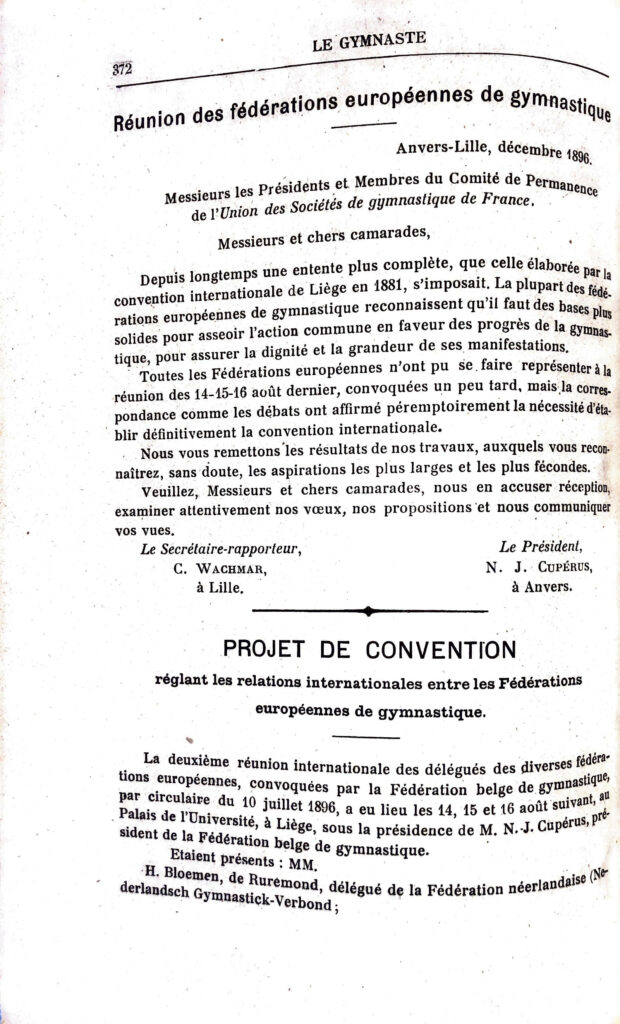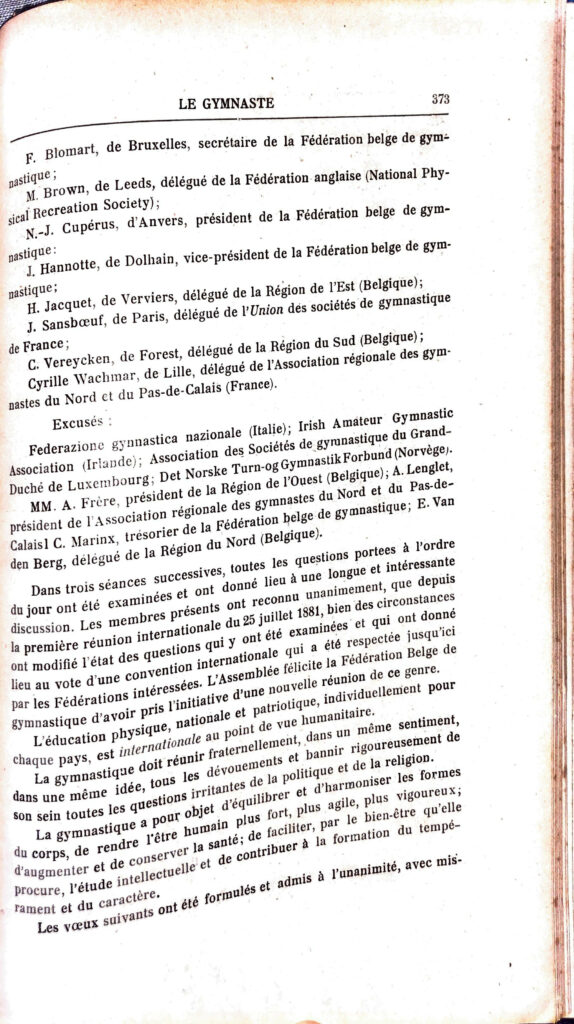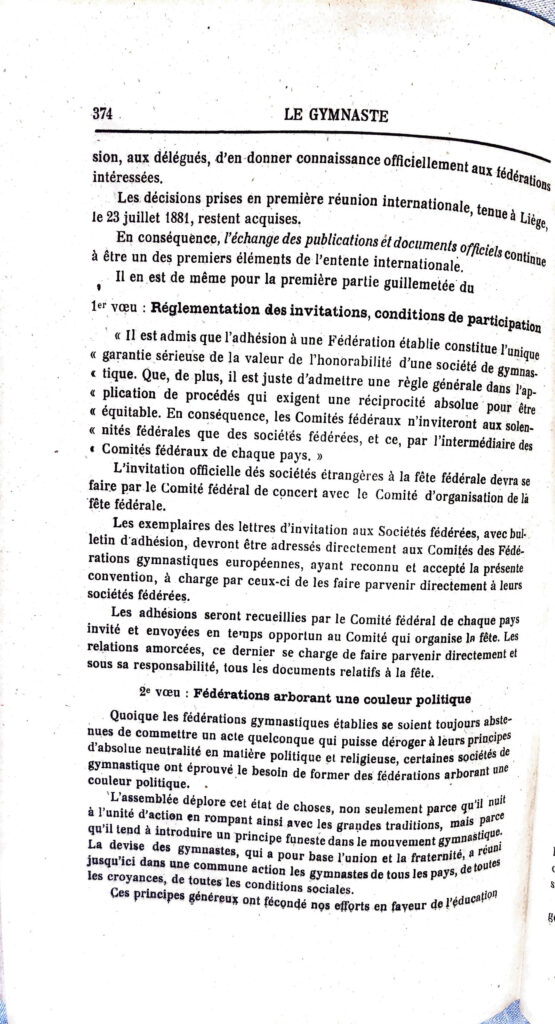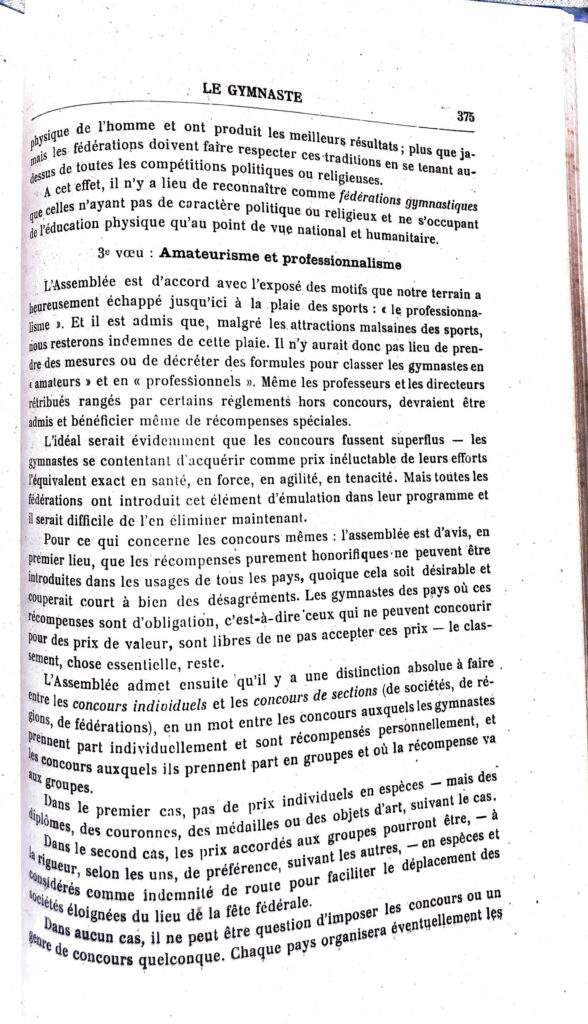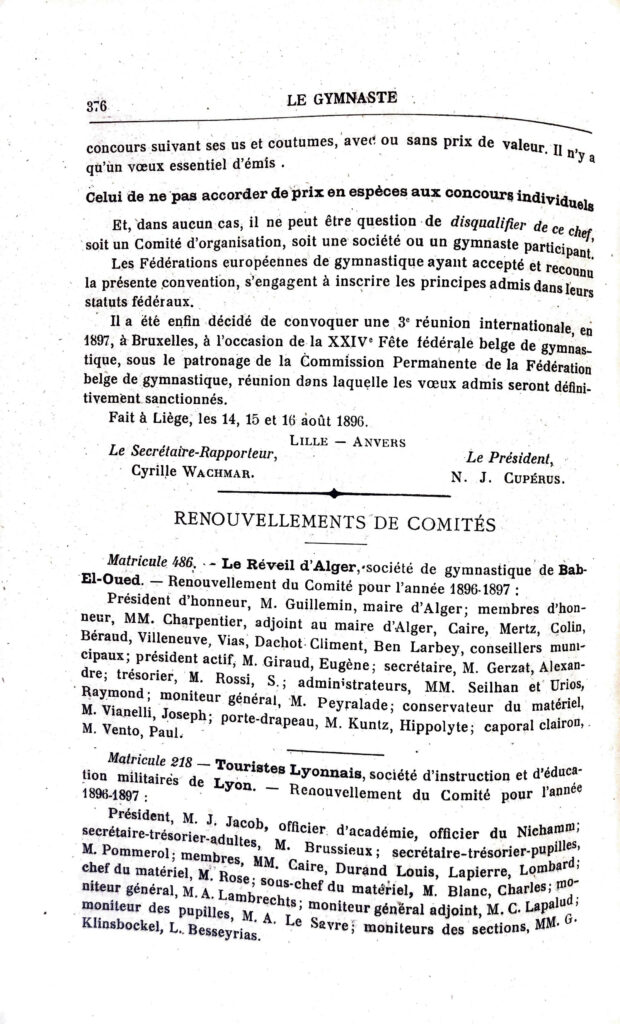What did the FIG discuss at its congress in 1896?
Here are the extant minutes from the meeting — as printed in Le Gymnaste, December 12, 1896.
Note: It wasn’t called the FIG at that point, nor was it called a Congress. What transpired was a meeting of the European Federations of Gymnastics (Fédérations européennes de gymnastique).
Attendance | Regulations of Invitations | Politics | Amateurism
Meeting of the European Federations of Gymnastics
Antwerp-Lille, December 1896
Messrs. Presidents and Members of the Standing Committee of the Union of Gymnastics Societies of France.
Gentlemen and dear comrades,
For a long time, a more comprehensive understanding, than that drawn up by the international Liege Convention in 1881, was required. Most European gymnastics federations recognize that a stronger foundation is needed to establish common action for the advancement of gymnastics, to ensure the dignity and grandeur of its events.
Not all the European Federations were able to be represented at the meeting of August 14-15-16, convened a little late, but the correspondence and the debates peremptorily affirmed the need to definitively establish the international convention.
We are submitting to you the results of our work, to which you will undoubtedly recognize the broadest and most fruitful aspirations.
Please, gentlemen and dear comrades, acknowledge our receipt, carefully consider our wishes, our proposals and communicate your views to us.
The Recording Secretary,
C. Wachmar,
In Lille
The President,
N. J. Cupérus,
In Antwerp
—
Convention Program
Regulating international relations between the European Gymnastics Federations.
—
The second international meeting of the delegates of the various European federations, convened by the Belgian Gymnastics Federation, by circular of July 10, 1896, took place on August 14, 15, and 16, at the Palais de l’Université, in Liege, under the presidency of Mr. N. J. Cupérus, president of the Belgian Gymnastics Federation.
Were present: Misters
H. Bloemen, from Ruremond, delegate of the Dutch Federation (Nederlandsch Gymnastick-Verbond);
F. Blomart, from Brussels, secretary of the Belgian Federation of Gymnastics;
M. Brown, from Leeds, delegate of the English Federation (National Physical Recreation Society);
N. J. Cupérus, from Antwerp, president of the Belgian Federation of Gymnastics;
J. Hannotte, from Dolhain, vice president of the Belgian Federation of Gymnastics;
H. Jacquet, from Verviers, delegate of the Eastern Region (Belgium);
J. Sansbœuf, from Paris, Delegate of the Union of Gymnastics Societies of France;
C. Vereycken, from Forest, delegate of the Southern Region (Belgium);
Cyrille Wachmar, from Lille, delegate of the Regional Association of Gymnasts from the North and Pas-de-Calais (France).
Regrets:
National Gymnastics Federation (Italy); Irish Amateur Gymnastic Association (Ireland); Association of the Societies of Gymnastics of Grand-Duché in Luxembourg; The Norsk Gymnastics Federation (Norway).
Misters A. Frère, president of the Western Region (Belgium); A. Lenglet, president of the Regional Association of Gymnasts of the North and Pas-de-Calais; C. Marinx, treasurer of the Belgian Gymnastics Federation; E. Van den Berg, delegate of the Northern Region (Belgium).
In three successive sessions, all the items on the agenda were taken up and gave way to a long and interesting discussion. The members present unanimously recognized that since the first international meeting of July 25, 1881, many circumstances have modified the state of the questions which were examined there and which gave rise to the vote of an international convention which was respected hitherto by interested Federations. The Assembly congratulates the Belgian Gymnastics Federation for taking the initiative of such a new meeting.
Physical, national and patriotic education, individually for each country, is international from a humanitarian point of view.
Gymnastics must fraternally unite, in the same feeling, in the same idea, all devotion and rigorously ban all irritating questions of politics and religion.
The object of gymnastics is to balance and harmonize the shapes of the body, to make the human being stronger, more agile, more vigorous; to increase and maintain health; to facilitate, through the well-being it provides, intellectual study and to contribute to the formation of temperament and character.
The following pledges were formulated and unanimously admitted by the delegates, giving official notice to the federations concerned.
The decisions taken at the first international meeting, held in Liège on July 23, 1881, remain in effect.
Accordingly, the exchange of official publications and documents continues to be a primary element of international understanding.
It is the same for the first quoted part of the
1st pledge: Regulation of invitations, conditions of participation
“It is recognized that membership in an established Federation constitutes the only serious guarantee of the worthiness of a gymnastics society. That, moreover, it is fair to admit a general rule in the application of processes that require absolute reciprocity in order to be equitable. As a result, Federal Committees will only invite federated societies to federal solemnities, through the Federal Committees of each country.”
The official invitation of foreign societies to the Federal Festivals will have to be made by the Federal Committee in conjunction with the Federal Festival Organizing Committee.
The copies of the invitation letters to the Federated Societies, with membership form, must be sent directly to the Committees of the European Gymnastics Federations, having recognized and accepted this agreement, on condition that they send them directly to their federated societies.
Memberships will be collected by the Federal Committee of each invited country and sent in due course to the Committee which organizes the party. The relations initiated, the latter is responsible for sending directly and under his responsibility all documents relating to the festival.
2nd Pledge: Federations sporting a political color
Although the established gymnastic federations have always refrained from committing any act which might derogate from their principles of absolute neutrality in political and religious matters, certain gymnastic societies have felt the need to form federations bearing a political color.
The assembly deplores this state of affairs, not only because it harms the unity of action by thus breaking with great traditions, but because it tends to introduce a disastrous principle into the gymnastic movement. The motto of the gymnasts, which is based on union and fraternity, has so far united gymnasts from all countries, all faiths and all social conditions in a common action.
These generous principles have enriched our efforts in favor of the physical education of man and produced the best results; more than ever, federations must uphold these traditions by standing above all political or religious competitions.
For this purpose, it is necessary to recognize as gymnastic federations only those not having a political or religious character and dealing with physical education only from a national and humanitarian point of view.
3rd Pledge: Amateurism and professionalism
[Note: You can read the definition of amateurism for the 1896 Olympics here. The Olympics took place before this meeting.]
The Assembly agrees with the explanatory memorandum that our field has fortunately escaped the scourge of sports so far: “professionalism.” And it is accepted that, despite the unhealthy attractions of sports, we will remain free from this plague. There would therefore be no need to take measures or decree formulas to classify gymnasts as “amateurs” and “professionals.” Even paid professors and directors ranked by certain rules should be admitted and even benefit from special rewards.
It would obviously be ideal if competitions were superfluous – gymnasts content to acquire as the inevitable price of their efforts the exact equivalent in health, strength, agility, tenacity. But all the federations have introduced this element of emulation in their program and it would be difficult to eliminate it now.
As regards the competitions themselves: the assembly is of the opinion, in the first place, that purely honorary rewards cannot be introduced into the customs of all countries, although this is desirable and would cut short many inconveniences. Gymnasts from countries where these rewards are compulsory, i.e. those who cannot compete for valuable prizes, are free not to accept these prizes – the ranking, which is essential, remains.
The Assembly then admits that there is an absolute distinction to be made between individual competitions and team competitions (of societies, regions, federations), in a word between competitions in which the gymnasts take part individually and are rewarded personally, and the competitions in which they take part in groups and where the award goes to the groups.
In the first case, no individual cash prizes – but diplomas, crowns, medals, or works of art, as the case may be.
In the second case, the prizes granted to the groups could be, – in a pinch, according to some, preferably, according to others, – in cash and considered as travel allowance to facilitate the movement of societies far from the place of the federal festival.
In no case can there be any question of imposing contests or any kind of contest. Each country will possibly organize the competitions according to its customs and traditions, with or without valuable prizes. There is only one essential pledge taken.
That of not granting cash prizes to individual competitions
And, in any case, there can be no question of disqualifying on this count, either an Organizing Committee, or a society or a participating gymnast.
The European Gymnastics Federations, having accepted and recognized this convention, undertake to include the accepted principles in their federal statutes.
It was finally decided to convene a 3rd international meeting, in 1897, in Brussels, on the occasion of the XXIV Belgian Federal Gymnastics Festival, under the patronage of the Standing Committee of the Belgian Gymnastics Federation, a meeting in which the wishes admitted will be definitively sanctioned.
Done in Liège, August 14, 15, and 16, 1896.
The Recording Secretary,
C. Wachmar,
Lille
The President,
N. J. Cupérus,
Antwerp
